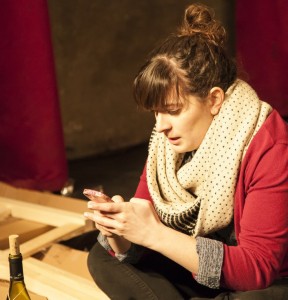The script for Help Me Out Here, an entry in the 2016 FRIGID New York festival, pulls material from text messages written when people were drunk, iPhone notes, personal journals, positive affirmation recordings, and sprawling Post-it notes on which writers look for the meaning of existence—all while assembling a chair from IKEA. Michael Joel and Kaitlin Overton, who conceived the script, also perform and co-directed the piece; they keep their real first names as the characters.
Taking on three jobs to produce one’s own work in the theater requires a dynamic, steadfast vision to provide the ultimate experience for the audience. When it occurs, magic happens; however, even though the angst of a younger generation lost in the mobile phone/social media argument—"If I’m so connected, why do I feel so alone?"—is conveyed in Help Me Out Here, the play comes up short. Conceptually it has footing, but with only 40 minutes of material, there are too many missteps.
He attempts to go to a party but instead listens to every neurotic thought in his head, delivered as a voice-over. Soon enough he is barely managing a lame excuse to the hostess to make his exit. Meanwhile, maybe because of the wine or just because she is growing weary waiting for a response to her text messages, Kaitlin falls asleep. The parts of an unfinished chair and the instruction manual are all around her.
Kaitlin’s challenge assembling an Ikea chair against the backdrop of life is a keen metaphor for both of them. The inclusion of her character, however, lacks conviction from the playwrights, as evidenced by her lack of dialogue. Michael battles with life, world and God issues while Kaitlin listens to positive affirmation on a CD and argues with a how-to manual. This type of dialogue only reaffirms the age-old myth that men are strong and educated, while women are weak and helpless.
A different director could have brought a fresh eye to the play: one who addresses cracks in the storyline while pulling/pushing the actors to dig deeper. Perhaps because of their closeness to this material neither Joel or Overton has addressed inconsistencies in the script. Kaitlin, in a text message, asks Michael if he has a screwdriver. When he arrives they finish the chair, but without a screwdriver, they never reference the screwdriver, using an Allen wrench instead.
However, the real problem is that the directors of Help Me Out Here have given Kaitlin so little substantial dialogue and a dated female story line. “I don’t understand these instruction booklets,” she says. “I never have and I never will.” Even in the modern age of IKEA, the writing behind Kaitlin’s monologues has not allowed her character to progress. Instead, she is relegated to being either unwilling or unable to understand an instruction manual or the need to have a man come to the rescue.
The next morning, Kaitlin awakens, still surrounded by the pieces of an unfinished chair, and she calls Michael. Human interaction, not another text message, moves him to come over. Maybe, after all, it’s not so much a man to the rescue but rather the bigger picture that people can accomplish more together with a glass of wine than by going it solo. Until the playwrights, or a different director, rethink the point of the angst, there is not much to help.
A No Dominion Theatre Company production, Help Me Out Here plays at Under St. Marks (94 St. Marks Place) in Manhattan. Remaining performances are Wednesday, Feb. 24, at 7:10 p.m.; Saturday, Feb. 27, at 10:30 p.m.; and Saturday, March 5, at 12:30 p.m. Tickets are $18 for adults and $13 for students at www.horsetrade.info. For a complete list of plays presented by FRIGID New York, visit www.horsetrade.info/frigid-festival.



